- Home
- David Downing
Zoo Stationee Page 25
Zoo Stationee Read online
Page 25
Back at the Savoy they packed, took a last look at the Thames, and joined Zarah and Lothar in the lobby. The car was on time, the Sunday roads empty, and they arrived almost two hours early. While Paul stood with his face glued to the window, Russell scanned the News of the World for a clue to British concerns. He discovered that a vicar had been assaulted by a young woman in a village street, and that now was the time to protect your crocuses from sparrows. A half page-ad for constipation relief featured a wonderful photographthe man really did look constipated. And much to Russells relief, the game theyd seen the previous afternoon got a highly critical write-upso at least it wasnt the norm.
It was the same aeroplane and crew which had brought them over. This time though, the clouds were lower, the flight rockier, the view more restricted. Jens, waiting for them at Tempelhof, hugged Zarah and Lothar as if theyd been away for weeks and thanked Russell profusely. He also offered to take Paul home, but Russell demurred, unwilling to sacrifice half an hour of his sons company.
As it was, Paul sat mostly in silence as they drove west, gazing out of the window at his home city. It seems . . . well, strange, he said, as they turned into his road. After being there, the idea of a war against England seems . . . it seems silly.
It is, Russell agreed. But coming nevertheless. And, in one way, the sooner the better. Say it lasted four years, like the last one. Assuming they stuck to the current call-up at eighteen, Paul would be drafted in March 1945. For the war to be over by then, it had to get started early in 1941.
No need to worry, Russell told himself. Hitler wouldnt be able to wait that long.
Blue Scarf
AFTER SPENDING THE NIGHT with Effi, Russell drove her out to the studio for an early start. She was pleased but not surprised by Dr. McAllisters diagnosisI said there was nothing wrong with him!but despondent about Mother. The director was a mechanic; her co-stars all thought, wrongly, that they were Gods gift to acting; the on-set adviser from the Propaganda Ministry kept trying to clarify the films social role by inserting lines that even a baboon would have trouble misunderstanding. I suppose I should be grateful, she said, as they drove in through the studio gates: Ill probably go down in history as one of Germanys great comediennes.
Afterward, Russell drove to Zoo Station, where he bought breakfast and a paper. Nothing unusual seemed to have happened during his time in England. The widening of the Kiel Canal had been decreed: It obviously wasnt big enough for the Bismarck. Hitler had opened the International Motor Show just down the road, and unveiled a model of the new peoples car. For 950 marksabout 50 British poundsthe average German would get a small five-seater, with deliveries to begin in about fifteen months time. Having made an appearance at this birth, the Führer had proceeded to the funeral of some obscure Carinthian Gauleiterthe man had probably held his hand when the bullets started flying in 1923. Hed certainly been given all the Nazi trimmings: swastikas everywhere, black banners with runic emblems, lines of flaming pylons to light his way across the Hesperus.
Back at Neuenburgerstrasse, Frau Heidegger was waiting to ply Russell with coffee. She was elated by his impression of British unreadiness for war, which she thought, rather perceptively, both lessened the chance of war and increased the chance of German success if there was one. Before retiring upstairs to work, Russell phoned Unsworth at the British Embassy. He was told that Conway had been in touch, and that representations were being made in the appropriate quarters. Russell thought about visiting the Wiesners but decided against it. He had nothing really to tell them, and instinctively felt that it was safer to limit his visits to the scheduled lessons.
He spent most of the next 48 hours working in his room, writing the fourth Pravda article, which he planned to deliver in Posen that weekend, and sketching out a piece on artists and entertainers for the Ordinary Germans series. His only trip out was to the Greiner Works in Wedding, one of the Reichs major production centers for military vehicles. Expecting suspicion and probable refusals, he went straight to the Labor Front office, and was almost laughably surprised by the warm welcome he received. Yes, of course the German worker was torn between his love of peace and his desire to arm the Fatherland against its foes. What human being would not be? And of course Herr Russell could talk to the workers about their feelings. The rest of the world should be given every chance to understand both the German hunger for peace and the nations determination to defend its rights and its people.
After this, talking to several groups of workers in the canteen proved something of an anti-climax. Most were understandably reticent, and those prepared to speak their minds had nothing surprising to say. It was a job, that was all. As usual, the pay was bad, the hours too long, management more of a hindrance than a help. The Labor Front at least listened, if only to ward off potential trouble. Open discussions were infinitely preferable to either noncooperationslow working, mostlyor the sort of covert resistance that could lead to sabotage. Reading between the lines and facial expressions of the men to whom he spoke, Russell decided that the level of noncooperation was probably significant without seriously affecting production levels or quality, and that the amount of real resistance was negligible. And when war came, he guessed, both would decrease.
Wednesday morning, he called in at the embassy on his way to the Wiesners. The moment he saw Unsworths face he knew what had happened. Hes dead, isnt he?
The official line is that he hanged himself, Unsworth said. Im sorry.
Russell sat down. A wave of sadnessof utterly useless sadnessseemed to wash over him. When? he asked. Has the family been told?
Unsworth shrugged. We received this note from the Foreign Ministry this morning. He passed it over. A reply to our representations on Friday.
The message comprised one sentence: In response to your enquiries of 18 February, we regret to inform you that the prisoner Wiesner has taken his own life, presumably out of guilt for his crime.
Wiesner had been dead within two days of his visit, Russell thought. Beaten to death, most probably. A blessed release, perhaps. But not for his family.
We assume the family has been informed, Unsworth was saying.
Why? Russell asked, handing back the note. Because its the decent thing to do?
Unsworth nodded, as if taking the point.
What about the visa situation? Russell wanted to know. Theres nothing to keep them here now. And surely. . . .
Im told the decisions on the next batch are being taken tomorrow afternoon. If you come back Friday morning I hope Ill have some good news for you.
Russell walked down the stairs and out past the line of visa-seekers on Unter den Linden. Once behind the Hanomags steering wheel he just sat there, staring down toward the Brandenburg Gate and the distant trees of the Tiergarten.
Eventually, almost somnambulantly, he put the car into gear and moved off, circling Pariserplatz and heading back up Unter den Linden toward Alexanderplatz and Neue Konigstrasse. What did you say to someone whose husband or father has just been murdered for the sin of being born to a particular race? What could you say? All around him the people of Berlin were going about their usual business, walking and driving and shopping and talking, laughing at jokes and smiling in friendship. If theyd heard of Sachsenhausen, they no doubt imagined neat rows of barracks, and some well-merited hard labor for the criminals and perverts residing there at the states pleasure. They hadnt seen a man they knew and liked twisted and torn out of human shape for the pleasure of others.
He couldnt even tell the story, not without Jens suffering for it. And even if he could, he had no evidence to back up his suppositions. The Nazis would claim that a crime like Wiesners was bound to provoke an angry reaction from his Aryan guards, and that the wretched Jew had simply taken the easy way out when he received a few well-deserved bruises. What, they would say, was the problem? Ev
eryone had behaved in a racially appropriate manner, and the world had one less Jew to worry about.
On the Wiesners street he sat in the car, putting off the moment of truth. There was another car parked on the other side of the road, its windows open, with two bored-looking men smoking in the front seat. They looked like Kripo, Russell thought, and they were probably on loan to the Gestapo, which was notorious for believing itself above the more mundane aspects of police work.
Well, there was no law against teaching Jewish children English. He got out, walked up the familiar steps, rapped on the familiar door. An unfamiliar face appeared in the opening. A rather attractive woman, with a mass of curly brown hair and suspicious eyes. In her late thirties, Russell guessed.
He introduced himself, and her face changed. Come in, she said. Youve heard? she added.
About Dr. Wiesners death? Yes. Half an hour ago, at the British Embassy.
As he spoke, Marthe Wiesner emerged from the other room, closing the door behind her. Herr Russell. . . . she began.
I cant tell you how sorry I am to hear about your father, he said. There were two broken table lamps on the wooden chest, he noticed, and the curtain rail was hanging at an awkward angle.
Thank you, she said stiffly. She seemed calmalmost overly sobut for the moment at least the light in her eyes had gone out. This is Sarah Grostein, she said, introducing the other woman. Shes an old friend of the family. Mother is . . . well, you can imagine. The shock was terrible. For all of us, of course. Mother and Ruth are sleeping at the moment.
Please give her my condolences, Russell said, the hollow words tripping off his tongue like. . . . He wondered whether to leave the safety deposit box key with Marthe, especially in the presence of a stranger. He decided against. I need to talk to your mother, he said. Not now, of course, he added quickly. Ill come at the usual time on Friday.
Marthe nodded, just as the sound of wailing erupted in the other room. A few second later Eva Wiesner called her elder daughters name. I must go. . . .
Of course. He waited until the door had closed before asking Sarah Grostein when the family had heard of Felix Wiesners death.
Saturday evening, she said. I wasnt here of course, but the police behaved abominably. I can understand why Albert lost his head.
Russells heart sunk. What did he do?
Oh, dont you know? He attacked the Gestapo bastard, hit him with one of these table lamps. The mans in the hospital. They said he might die, but Marthe says it didnt look that bad. I think they were just trying to scare Eva.
Where have they taken Albert? he asked. The wailing was quieter, but just as insistent.
She gave a bitter laugh. They havent. He got away. Pushed the other bastard over the sofa and ran for it. He got out the backtheres a maze of alleys out thereand the conscious one knew better than to follow him. He wouldnt have found Albert, and he knew damn well he might not come out again.
Wheres Albert now?
No one knows, she said, leaving Russell with the distinct impression that she was lying. They came back yesterday, she went on. Shouted at Eva to tell them where he was, which she couldnt have told them if shed wanted to. But they didnt arrest her. Maybe they realized that there was no one else to look after the girls, that theyd be up to their eyes in paperwork if they tried to send them away somewhere.
Maybe, Russell agreed. He thought it more likely that the British expression of interest in Wiesners fate had kept the Gestapo in check. Can you pass on a message to Frau Wiesner? Tell her. . . . He paused. I was going to say that it looks like the children will get British visas in the next week or so, but it doesnt seem as though Albert will have any use for his. If he goes to the Germans for an exit visa, theyll just arrest him. Still, the girls should be able to go. And maybe their mother, too.
She wont leave Albert.
Perhaps he can persuade her.
Perhaps. But the Gestapo are parked outside, which makes arranging meetings rather difficult.
He looked at her, standing there with arms crossed and anger simmering behind her eyes. Are you trying to get out? he asked.
Not at present, she said, in a tone that didnt invite questioning.
Ill get going, he said. Ill be back on Friday morning.
She nodded, opened the door, and closed it behind him. He walked out to the car, ignoring the watching police, and drove it slowly down Neue Konigstrasse toward the city center. He knew there was nothing more he could do, but that knowledge did nothing to diminish the feelings of anger and helplessness which dogged him through the rest of that day and the next. By the time he entered the British Embassy on Friday morning he felt ready to explode, but equally certain that murdering anyone other than Hitler would only make matters worse.
British entry visas for the three Wiesner children were waiting on Unsworths desk, but Unsworth had the decency not to be too pleased with himself. Ive found out why the mothers been refused, he told Russell. The intelligence people have quite a dossier on her. She was a Spartacistyou know what they were? Of course you do. Apparently they grade communists out of ten, and anyone scoring over seven is refused immigration. Eva Wiesners an eight.
Russell was astonished. How recent is this information?
It isnt. The dossier has nothing later than 1919, so she probably gave up politics when she got married. But that wont help her. An eights an eightthats what their man told me. . . .
Trelawney-Smythe?
Youve met him. No exceptions, he said.
Russell didnt know whether to laugh or cry. I dont suppose it matters, he said, before explaining about Albert.
Half an hour later he was back in Friedrichshain. This time Frau Wiesner opened the door, and managed a slight smile as she let him in. After brushing aside his condolences, she sat him down and made them both coffee. He was a wonderful man, she said. And nothing can take that away from him, or from me.
He gave her the British entry visas for the three children, and explained why she was being refused.
She smiled sadly at that. I thought that must be the reason, she said, but it doesnt matter now. Take this back, she added, handing over Alberts visa. Someone else can take his place.
He also gave her the safety deposit box key, and a piece of paper containing two names and addresses. This is the bank where the box is, and this is my agent in London, Solly Bernstein. Get the girls to memorize it all, and then burn it, he said. And I think it would probably be safer for you to keep the key yourself. Solly has another one, and they can use that when they get to London.
She stared at the writing, as if it were in a foreign language.
Have you seen Albert? he asked.
She shook her head. But hes all right.
AFTER LEAVING EFFI AT THE STUDIO early the next morning, he took the car back to her street and walked to Zoo Station. With an hour to wait for the Warsaw train, he had breakfast in the buffet before climbing up to the eastbound platforms. It was the first time, he realized, that hed been up there since McKinleys death. He had no idea where the American had gone under his train, and a morbid search for telltale signs came up empty. If there was one thing at which the Germans were good, it was cleaning up after themselves.
He put five pfennigs in a toasted almond machine, and walked down the platform eating from his cupped hand. It was a misty morning, the trees in the Tiergarten fading by stages into nothing. Some geese flew across the glass dome of the station, squawking noisily, heading God-knew-where for late February. There were few finer sights, Russell thought, as their V-formation curled and furled like a banner in the wind. He remembered the seagulls at the Bismarck launching, and laughed out loud.
The Warsaw train arrived, empty save for the few who had boarded
at Charlottenburg. Russell found his seat by the time it reached Friedrichstrasse, and dropped off to sleep as the last of the southeastern suburbs slid past his window. Dimly aware of the stop at Frankfurt-am-Oder, he was roused by officialdom for the customs stops on either side of the Polish border, and spent the rest of the journey staring out of the restaurant car window. A wintry sun had finally burned off the mists, and the rye and potato fields of Prussias lost province stretched away into the distance, interrupted only by the occasional dirt-track or farm, the odd meandering stream.
The train rolled into Posenor Pozna?, as the plethora of signs proclaimeda few minutes early. Russell took a taxi from the forecourt to the Bazar Hotel, where hed booked a room. Just the one night? the receptionist asked incredulously, as if the charms of Posen required weeks to appreciate. Just the one, Russell agreed, and was shown rather begrudgingly to an adequate first-floor room. There were only a few hours of light remaining, so he went straight back out again, pausing only to examine the display in the lobby, which documented the hotels pre-war role as a hotbed of Polish nationalism.

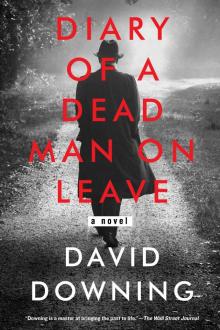 Diary of a Dead Man on Leave
Diary of a Dead Man on Leave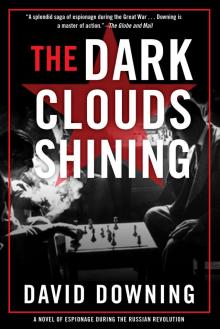 The Dark Clouds Shining
The Dark Clouds Shining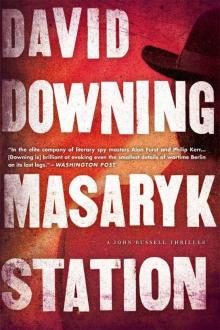 Masaryk Station (John Russell)
Masaryk Station (John Russell)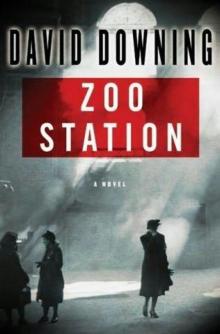 Zoo Stationee
Zoo Stationee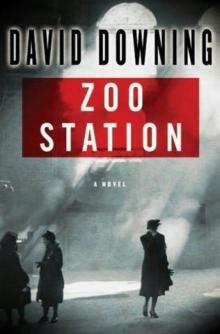 Zoo Station jr-1
Zoo Station jr-1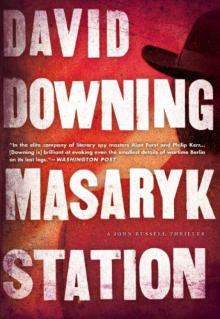 Masaryk Station
Masaryk Station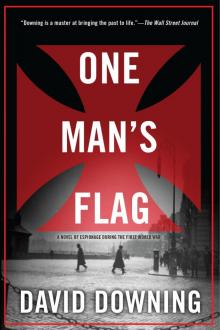 One Man's Flag
One Man's Flag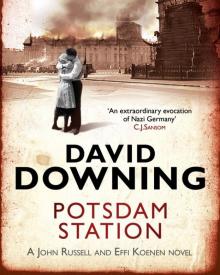 Potsdam Station jr-4
Potsdam Station jr-4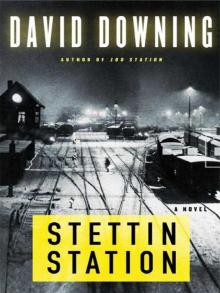 Stattin Station jr-3
Stattin Station jr-3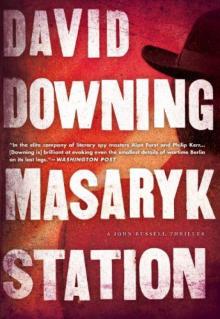 Masaryk Station jr-6
Masaryk Station jr-6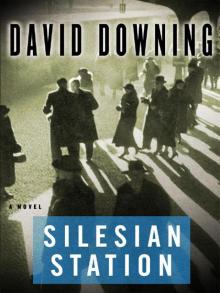 Silesian Station (2008) jr-2
Silesian Station (2008) jr-2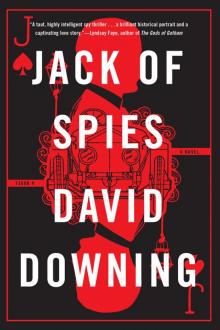 Jack of Spies
Jack of Spies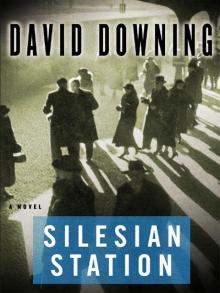 Silesian Station (2008)
Silesian Station (2008) The Moscow Option
The Moscow Option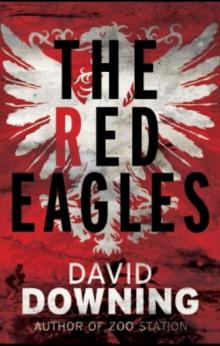 The Red Eagles
The Red Eagles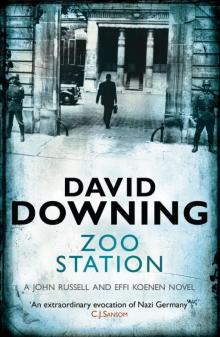 Zoo Station
Zoo Station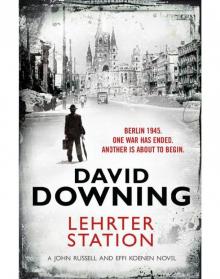 Lehrter Station
Lehrter Station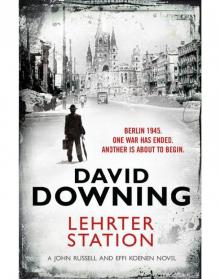 Lehrter Station jr-5
Lehrter Station jr-5